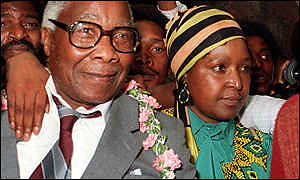
Govan Mbeki, the author of "The Peasant's Revolt", was a leading theoretician in the South African struggle as a member of the African National Congress and the South African Communist Party., a photo by Pan-African News Wire File Photos on Flickr.
Sunday, April 01, 2012 7:23:33 PM
Black farmers in need of dedicated finance
April 1 2012 at 12:18pm
South African Independent
Agricultural finance has always been an integral part of agricultural prosperity in South Africa. Since Jan van Riebeeck and the subsequent colonisation of the country, finance for farmers has always been an intrinsic aspect of agriculture and food security. Without proper credit paid back at reasonable interest rates, which were below market rates, the local 40 000 strong commercial farming sector would not exist as we know it today.
The first Dutch settlers that arrived in the Cape were tasked with providing vital supplies to the shipping fleets of the Dutch East India Company. These supplies included fresh agricultural produce.
The importance of financial support in agriculture is also evident in the fact that in African society, a neighbour in need of resources to engage in agriculture would receive a commodity in what was equivalent to a loan from a more prosperous member of society.
For instance, if a poorer member of the community needed milk and meat, a cow would be made available to that member. Once the cow produced offspring and the needy neighbour had plenty of milk for himself and his family, that cow would then be returned to its owner.
Fast forward to the present and finance in agriculture is still prevalent. The only difference is that it has changed form to suit the current macroeconomic conditions. For example, loans are provided through currency and people no longer use the barter system.
The question that lies at the heart of South Africa’s agricultural discourse is whether the current financing models for black emerging farmers is working.
Kosie van Zyl, 82, who has been in agriculture for decades and once served on the now defunct Agricultural Credit Board, believes that the story of finance in agriculture is a long and complex one with no clear answer.
After the Agricultural Credit Act 20 of 1966 was published, farmers had to apply to commercial banks for loans. However, if they did not access loans, they could approach the Land Bank and pay back their loans at interest rates of 5 percent to 8 percent. In addition, the Agricultural Credit Board could use commodities such as livestock and tractors as security.
However, the act was a whites only act that excluded black farmers who were banished to the homelands by the apartheid regime and forced to farm on unproductive and uneconomic lands. According to Van Zyl, the homelands had their own development co-operatives. The act turned into a general act in 1992.
“After that the credit board was flooded with applications from farmers across the board, mainly from the North West and KwaZulu-Natal,” he remembers.
What was most enticing to these farmers is that the deal presented by the Agricultural Credit Board provided a critical lifeline.
Farmers could purchase land and pay over 30 years, and purchase tractors and pay over 15 years.
The favourable interest rates relieved the pressure of having to worry about paying back large amounts of money from a business that had very low profit margins as is the case in most start up agricultural enterprises.
But in 1998, the Agricultural Credit Board closed under the recommendations of the Strauss Commission, which said the function of the board should be incorporated into the Land Bank. Van Zyl was critical of this move as it placed the burdens of a developmental bank on a commercial bank.
The implications of this move would be felt till the present day. It appears as though the fact that the Land Bank, as a commercial bank, had a mandate to serve the interest of its shareholders was never taken into account.
Research from the Land Bank suggests that the impact of the deregulation in the agricultural sector compelled institutions that supported emerging farmers to rethink their funding, marketing and support models.
“The government embarked on an aggressive land reform programme with a specific target of distributing about 30 percent of agricultural land to black South Africans. However, the transition from emerging farming to commercial agriculture remains a daunting challenge,” the research reads.
The Land Bank is the only government-owned entity that provides agricultural finance. It became a developmental institution in 2002.
According to Moraka Makhura, an executive at the Land Bank, the institution finds itself in a dilemma where it has to serve investors interests and play a developmental role at the same time.
“The Land Bank may be government-owned but it also needs money from the markets, and investors want to see returns based on market expectations,” he explained.
This was one of the reasons why the bank provided finance on market related interest rates, which places emerging farmers under strain as the first few years of farming are generally not profitable. While some of the successes of the Land Bank are commendable, the current financing models are not sustainable for black farmers.
White commercial farmers benefited from the Agricultural Credit Board in the past, but similar mechanisms need to be put in place for black emerging farmers. They need an institution that will focus on their needs and development without worrying about pleasing the markets. - Ayanda Mdluli
No comments:
Post a Comment